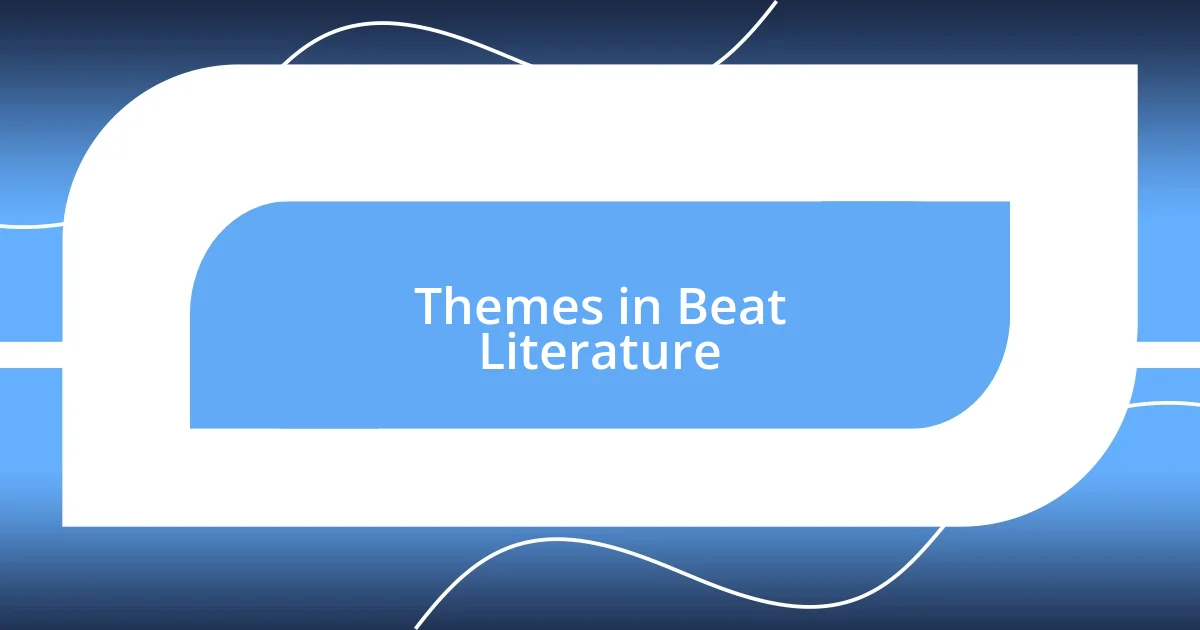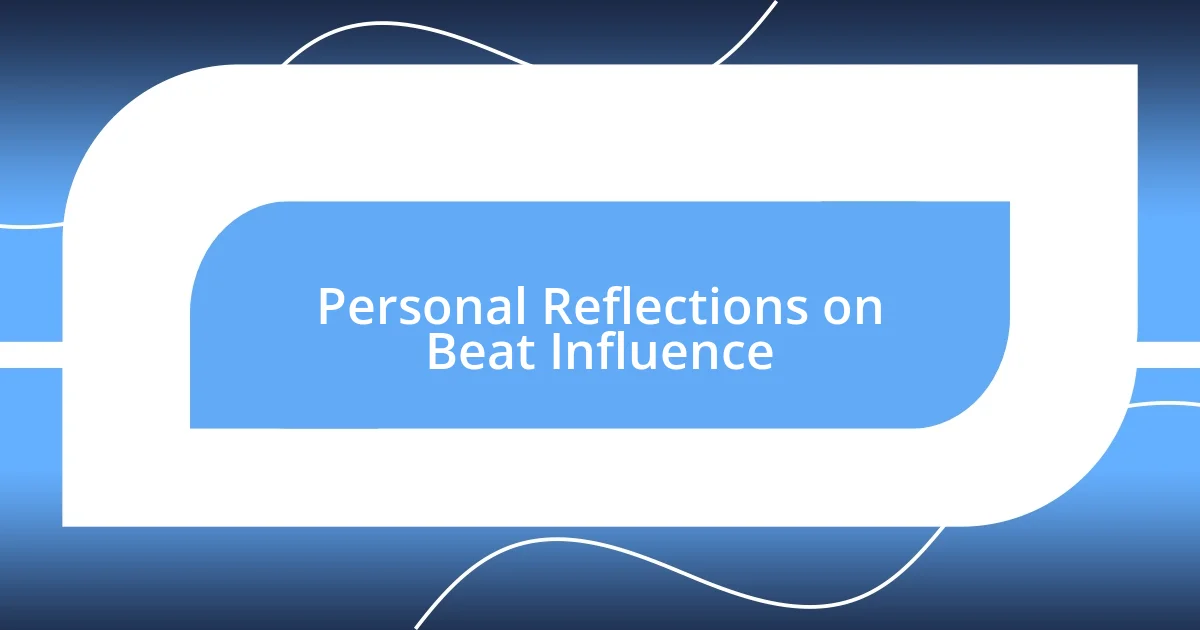Key takeaways:
- The Beat Generation, emerging in the 1940s and 1950s, was a cultural revolution promoting authenticity and personal freedom through literature and art.
- Key themes in Beat literature include the search for authenticity, celebration of spontaneity, and exploration of spirituality, highlighting personal truth and life’s unpredictability.
- Personal engagement with Beat works inspired a commitment to vulnerability, spontaneity, and questioning societal norms, emphasizing the importance of honest self-expression and creativity.

Introduction to the Beat Generation
The Beat Generation was more than just a literary movement; it was a cultural revolution that emerged in the 1940s and 1950s. I often think back to how their raw, honest expressions resonated with a society yearning for authenticity in a world filled with conformity. What was it about their words that made a deep connection? Perhaps it was their willingness to explore themes of personal freedom, spirituality, and societal critique, offering a voice to those disillusioned by mainstream culture.
I still remember the first time I stumbled upon Jack Kerouac’s “On the Road.” The way he painted the American landscape felt like an invitation to a new way of seeing life—adventurous, spontaneous, and unapologetically real. It really struck me how the Beat writers, like Allen Ginsberg and William S. Burroughs, challenged societal norms and encouraged readers to think outside the box. Their ability to weave profound insights into everyday experiences left me wondering: what can we learn from their approach to life and creativity today?
At the heart of the Beat Generation was a fierce rejection of materialism and a quest for deeper meaning. I often reflect on how their journey through jazz, art, and poetry revealed the richness of existence that can often go unnoticed. Have you ever felt that urge to break free from the mundane? The Beats encapsulated that desire, encouraging individuals to pursue their passions and embrace the beauty of unfiltered experience.

Themes in Beat Literature
The themes in Beat literature reflect a profound exploration of the human experience. One key theme that resonates is the search for authenticity. When I first read Ginsberg’s “Howl,” it was like a jolt of electricity. His candid exploration of love, sexuality, and mental illness broke boundaries that felt unapproachable, pushing me to confront my own struggles. This theme of seeking truth in a superficial world not only shaped the Beats’ writing but continues to inspire readers to embrace their vulnerabilities.
Another significant theme is the celebration of spontaneity and the rejection of societal norms. I recall a road trip I took where the spirit of adventure evoked the essence of Kerouac’s prose. His celebration of living in the moment urged me to enjoy the journey rather than fixate on the destination. This theme encouraged me to appreciate life’s unpredictable nature, emphasizing that sometimes the most meaningful experiences stem from unplanned moments.
Finally, spirituality and transcendence also play a crucial role in Beat literature. I think back to my experiences meditating, and how they echo the explorations of the Beats, who sought connection with something greater than themselves. Their quest for deeper understanding of existence through Zen Buddhism and other spiritual traditions opened my eyes to diverse philosophies, inviting me to find my unique path to enlightenment.
| Theme | Description |
|---|---|
| Search for Authenticity | Exploration of personal truth and vulnerability, as demonstrated in Ginsberg’s “Howl.” |
| Spontaneity | Encouragement to embrace life’s unpredictability, similar to the journeys chronicled in Kerouac’s work. |
| Spirituality | Quest for a deeper understanding of existence through various philosophical practices. |

Personal Reflections on Beat Influence
Reflecting on the influence of the Beat Generation in my own life, I can’t help but feel inspired by their unabashed honesty. Their willingness to bare their souls in writing ignited a fire within me, pushing me to explore my own thoughts more deeply. I recall sitting in a dimly lit café with a worn copy of “On the Road,” feeling the resonance of their adventures seep into my veins. It felt like every word was a call to be true to myself, reminding me that vulnerability can be a powerful source of strength.
- The Beat Generation transformed my understanding of personal expression.
- Their candidness about flaws and failures made me realize that we thrive on our complexities.
- I started journaling my own experiences, letting emotions flow freely, just like Kerouac’s spontaneous prose.
Engaging with their works not only shaped my creative writing but also influenced my perspective on society. I remember attending a poetry reading where the energy mirrored the Beats’ legendary gatherings. Each voice, each poem challenged the status quo, sparking a sense of community among those who felt out of place. It made me appreciate how art can be a catalyst for change and an anchor for connection in a fragmented world.
- That poetry reading felt almost electric, energizing my desire to express my views.
- I learned that literature can unite people from diverse backgrounds, just as it did for the Beats.
- Their influence encouraged me to become an advocate for authenticity within my own circle.

Lessons Learned from Beat Experiences
One of the most powerful lessons I took from my Beat experiences is the importance of embracing vulnerability. I remember a rainy afternoon when I decided to share a poem I had written at an open mic night. My hands shook nervously as I spoke, but the moment I finished, I felt an overwhelming sense of relief. It reminded me that sharing our truths, much like the Beats did, can be liberating and build connections with others who may feel the same.
Another key takeaway for me is the notion of spontaneity in life and creativity. I reflect on a time when I spontaneously joined friends on a road trip, armed only with a camera and an open heart. We had no itinerary, which led us to incredibly unexpected moments—sunrise over a lake, laughing until we cried over campfire stories. This reminded me of Kerouac’s philosophy: sometimes, the best experiences come not from careful planning but from simply being present.
Lastly, the Beat Generation taught me the value of questioning societal norms. I recall the heated discussions I had with friends about conformity and rebellion after reading “Naked Lunch.” Those conversations ignited a passion in me to challenge expectations and think critically about the world around me. It was as if the Beats were urging me to pursue my own path, encouraging me to not just accept things as they are, but to actively shape my beliefs and actions.














